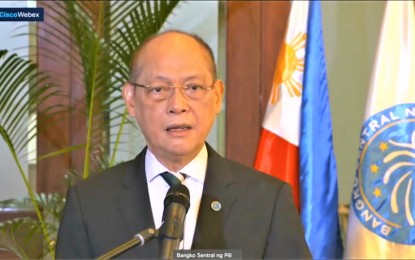
BSP Governor Benjamin Diokno. (File photo)
MANILA – The continued reduction in the Bangko Sentral ng Pilipinas’ (BSP) key policy rates is aimed at encouraging banks to lend more to their clients to help spur economic activities and address the slump caused by the pandemic.
Banks, however, remain cautious and have not even reduced their rates based on the cuts made by the central bank, BSP Governor Benjamin Diokno said.
In a virtual briefing Thursday, Diokno said the interest rate of the 91-day Treasury bill (T-bill) has fallen by 217 basis points in the first 10 months this year relative to its end-December 2019 levels while the rate of the same tenor in the secondary market has declined by around 212 basis points.
“However, bank lending rates have been slow to adjust, in part because of risk aversion and concerns on asset quality,” he said.
Since the start of the year, BSP’s key policy rates have been slashed by a total of 200 basis points, mainly due to the lower inflation rate and to help boost growth vis-à-vis the expectations of weak global growth due to the virus-induced pandemic.
Diokno said, “banks appear to prefer higher lending rates to offset risk and related operational costs.”
He said a central bank survey last June showed that relief measures for micro, small and medium enterprises (MSMEs) have posted gains.
One of these relief measures is the consideration for banks’ lending to the MSMEs in compliance with the reserve requirement rule.
Diokno said lending rates given in the lower limit of microenterprise loans dropped by 100 basis points to 5.9 percent relative to pre-lockdown levels.
Interest in SME loans also fell 30 basis points to 5.5 percent during the same period.
These developments, Diokno said, “suggest that the impact of the BSP’s policy actions could take a longer time to materialize,”
“Yet, even as BSP is prepared to implement additional policy measures, fiscal policy should play a more significant role in helping restore market confidence,” he noted.
The government’s fiscal measures have been questioned several times since these are relatively lower compared to what the central bank has done so far and compared to those invested by neighboring countries.
Aside from the rate cuts, the BSP has reduced banks’ reserve requirement ratio (RRR) by as much as 200 basis points, has extended a PHP300 billion short-term repurchase deal with the national government, and has provided the national government a PHP540 billion provisional advance.
Aside from public health interventions, Diokno said fiscal measures should also cover supply bottlenecks, support domestic demand by extending wage subsidies and loans to support household incomes, and ensure the employment of displaced workers.
“Across the Asean (Association of Southeast Asian Nations), it appears that there could be scope for higher fiscal stimulus,” he added. (PNA)
